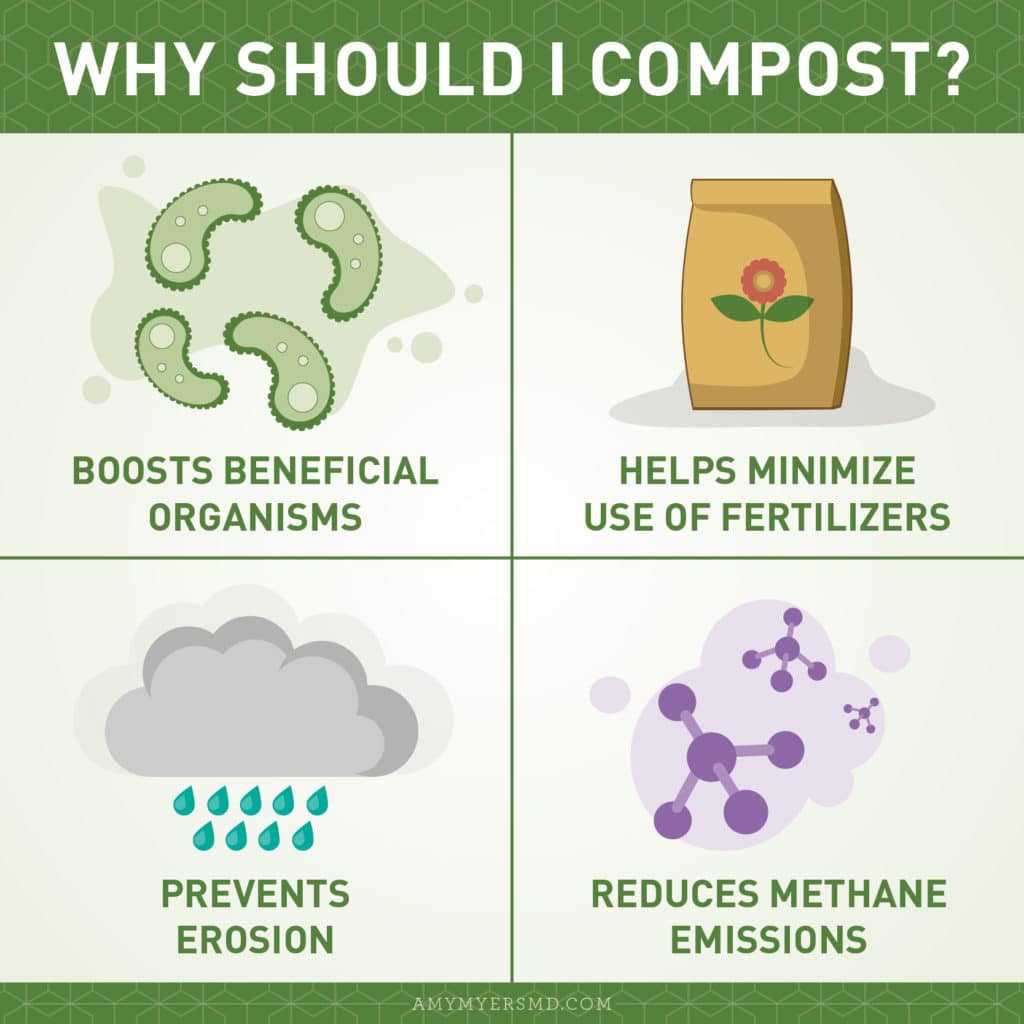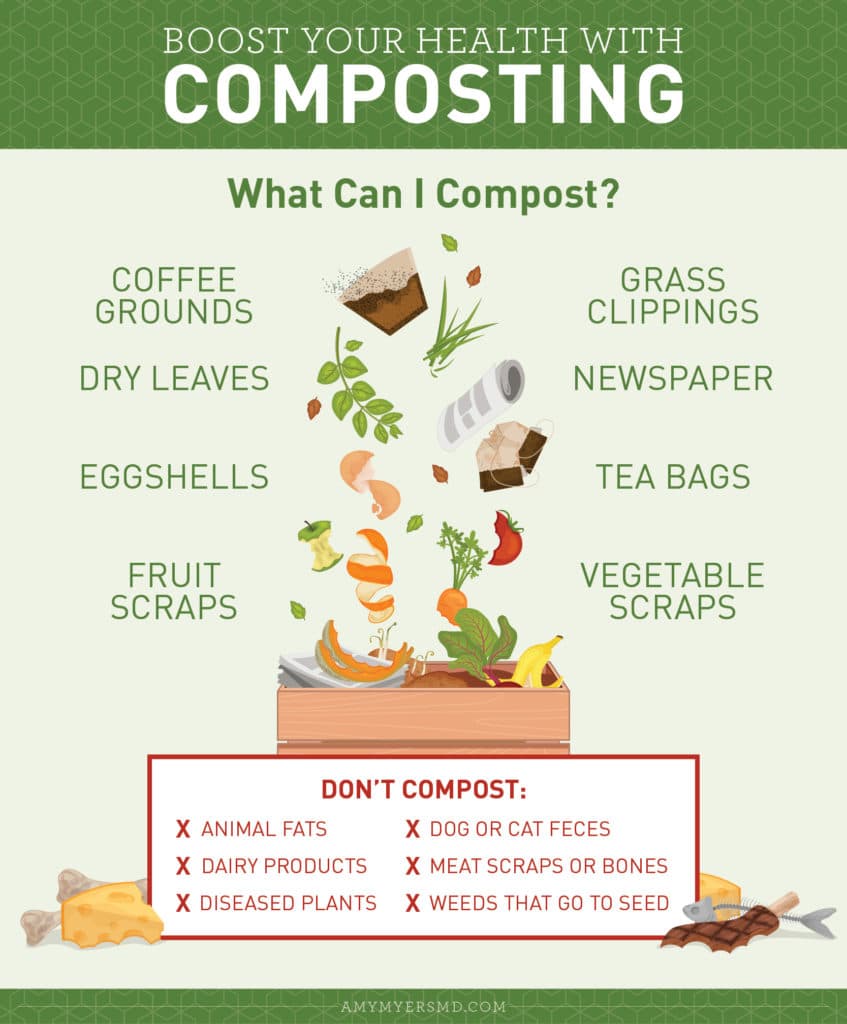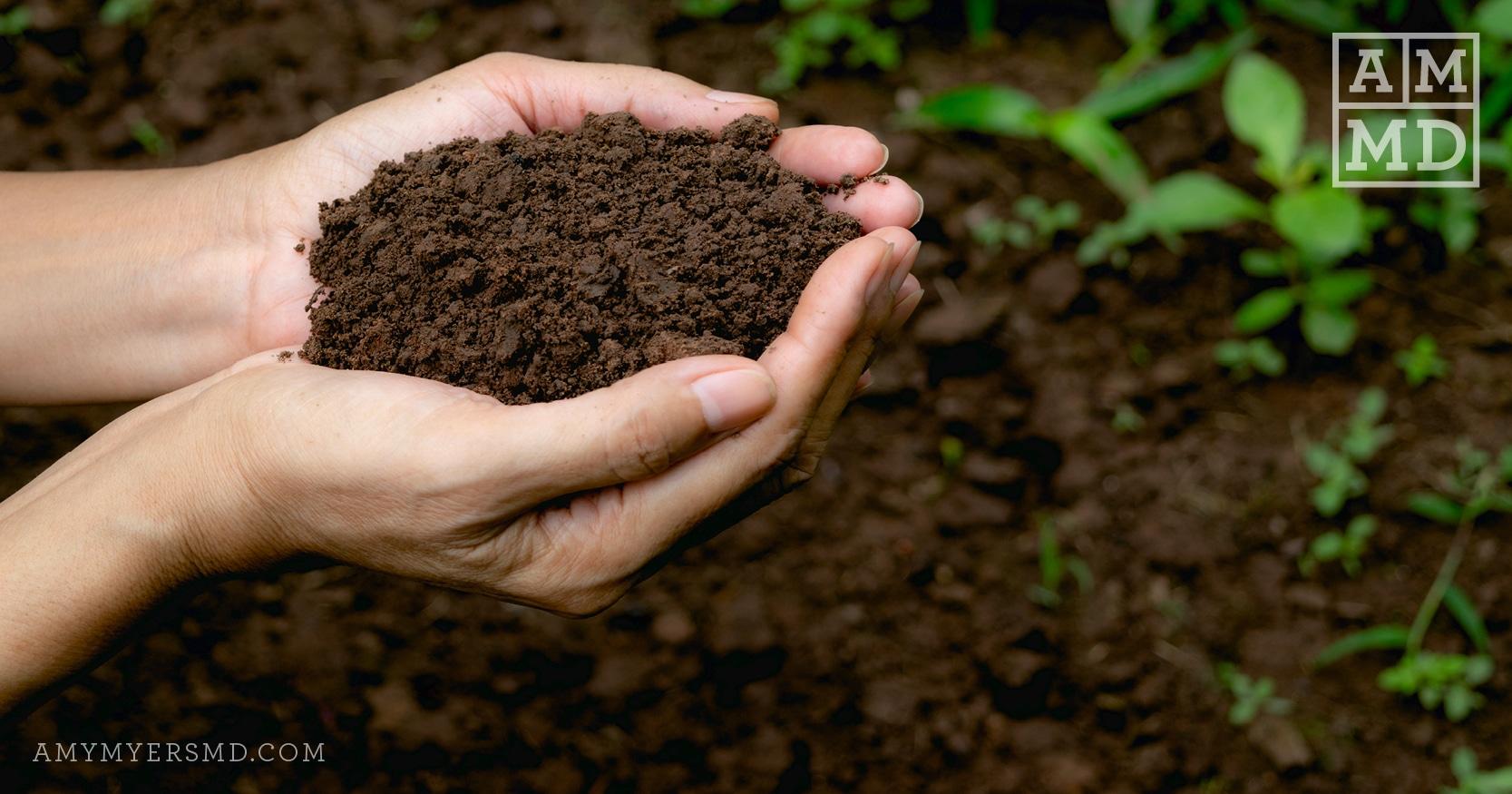Those of you who are familiar with The Myers Way® may have heard me say, “You are not what you eat, you are what you digest and absorb.” This has never been more true than today when the quality of even our organic foods is at risk through soil depletion.
That’s why I advocate composting and doing everything we can to boost the nutrients in our food and supplements. So how does composting affect the nutrients in our food? Let’s take a look at what soil depletion is and its impact, and then I’ll explain how composting ties in.
What is Soil Depletion and How Does It Impact My Food?
The modern cultivation practices used by most large, corporate growers focus on speeding growth, increasing size, and improving pest resistance. Increases in yield that are produced by the chemical fertilizers used by these growers tend to decrease the concentrations of minerals in plants. This is called the “dilution effect.”1
Modern agriculture has increased the food supply, making more food available for more people. However, in the process, it has also stripped the nutrients from the soil in which our food grows. This is called soil depletion or soil degradation. Every new season of crops grown actually increases the problem.
A study at the University of Texas analyzed nutritional data from the US Department of Agriculture. This data compared 43 different fruits and vegetables for two periods that were 50 years apart. The study found significant declines in calcium, iron, riboflavin (vitamin B2), and vitamin C. You can read more about what they found in this article.
The same researchers believe declines in other nutrients such as magnesium, zinc, and vitamins B6 and E are likely, as well.2 Another study concluded that you’d have to eat eight oranges to get the same amount of vitamin A your grandparents got from enjoying just one!3
The sad fact is the food we’re eating now just doesn’t have the nutrients it used to have. The soil nutrients just aren’t there. Yet, there is something we can do about this!
What is Composting?
When I was a US Peace Corp volunteer in rural Paraguay, I helped teach sustainable, organic gardening techniques to the farmers there. You can learn more about my experiences in Paraguay here. We created a huge composting pile that was a critical part of ensuring the quality of the food grown there. My time there was one of the most enriching experiences of my life! I’d like to share with you some of what I learned and taught.
Composting means recycling organic waste.
Composting is probably the world’s oldest form of recycling. In fact, it’s what our planet does when left to its own devices. Composting really just means recycling organic waste such as kitchen scraps or yard waste.
Those vegetable scraps contain nutrients that will help grow more healthy plants.4 Putting those nutrients back in the earth helps resolve the issue of soil depletion.
 Dr. Amy Myers
July 19th, 2020
https://content.amymyersmd.com/article/composting/Why Should I Compost? – Infographic – Amy Myers MD®
Dr. Amy Myers
July 19th, 2020
https://content.amymyersmd.com/article/composting/Why Should I Compost? – Infographic – Amy Myers MD®What Are the Benefits of Composting?
Aside from keeping waste out of landfill, composting has several other benefits.
1. Composting Boosts Beneficial Organisms
Composting is a process by which organic matter such as food scraps, is broken down by naturally occurring bacteria and fungus in the soil to form compost. In fact, composting actually encourages the growth of those beneficial bacteria and fungi in the soil.5 These organisms help suppress plant diseases and pests, lessening the need for pesticides.
2. Composting Helps Minimize Use of Fertilizers
Compost also minimizes or alleviates the need for artificial fertilizers that include nitrates. Nitrates cause algae blooms that result in massive fish die-offs. Nitrate-contaminated drinking water has been linked to methemoglobinemia (blue baby syndrome), various cancers, neural tube defects, diabetes, and thyroid conditions.6
3. Composting Prevents Erosion
Composting enriches the moisture content of the soil, preventing soil erosion by keeping it from washing away in storms or drying up and blowing away.
4. Composting Reduces Methane Emissions
It also improves air quality by reducing methane emissions from landfills. In fact, composting can make a huge difference because up to 25% of municipal waste in the US is material that could be composted.7
What Can I Compost?
Whether you live on acres in the country with room for a compost heap, a small suburban lot, or even an apartment, you can compost. You don’t even need to be a gardener. If you can’t use the compost yourself, donate it to a local school or community garden. Even the most urban areas have these.
Do compost these:
- Coffee grounds
- Dry leaves
- Eggshells
- Fruit scraps
- Grass clippings
- Newspaper
- Tea bags or leaves
- Vegetable scraps
Don’t compost these:
- Animal fats
- Dairy products
- Diseased plants
- Dog or cat feces (these are not the same as manure)
- Meat scraps or bones
- Weeds that go to seed
 Dr. Amy Myers
July 19th, 2020
https://content.amymyersmd.com/article/composting/Boost Your Health With Composting – Infographic – Amy Myers MD®
Dr. Amy Myers
July 19th, 2020
https://content.amymyersmd.com/article/composting/Boost Your Health With Composting – Infographic – Amy Myers MD®How Do I Compost?
I’m going to cover how to do this indoors in a small space. You can purchase kits for this with all the components you need. If you have a yard or garden where you can create a compost pile, the instructions are essentially the same, just on a larger scale. There are also great resources online to walk you through this process, or you can check out your local agricultural extension service.
The composting process is actually very simple and you don’t need to worry about attracting pests if you have a tight-fitting lid on your container. And you won’t need to be concerned about a “garbage odor” if you follow the steps below.
You’ll need:
- Container
- Newspapers
- Water
- Soil
- Red wriggler worms (available online)
- Organic scraps
- Prepare the Container
You can purchase a specially-made metal or ceramic container, or just use a large plastic bin. You’ll need to poke holes in the base and top of the plastic bin for ventilation and drainage and place a tray beneath it to catch any water that drains. You can keep it under the sink but it works faster in a cool area that gets some sun. - Arrange the Components
Soak some strips of newspaper in the water and line the bottom of the bin with them. Put in some potting soil and drop in the worms. You’ll need one pound of worms for every square foot of container. - Toss in Scraps
Toss in your scraps. Each time you add scraps to your compost pile, cover it with more soaked paper strips. - Repeat the Process
Keep piling scraps and paper in your compost bin until it’s full. When the contents are decomposed (usually about three months) and looks pretty much like soil, it’s ready to be used or donated.
It’s All About Optimizing Your Health
This simple process of composting can improve plant health tremendously. That’s because compost supplies nitrogen, phosphorus, and potassium, as well as micronutrients. Choosing produce that contains more nutrients is one way of boosting our overall health.
I realize many people don’t have room to create a large outdoor compost pile or the time to grow your own vegetables in the rich soil you create. I only have a very small garden at my home in Austin that’s not nearly big enough for all our needs. We’re planning a much larger garden and compost pile at our home in Santa Fe. However, for now we’re also exercising the next best option — purchasing organic vegetables grown in naturally-enriched soil.
I also recommend supplementing your diet with The Myers Way® Multivitamin, even if you select organic vegetables. I custom-formulated my multi to have high levels of key nutrients for general wellness and detoxification.
Optimal selenium, zinc, and iodine levels in my multi support thyroid health. It’s also a great source of B vitamins in their activated forms to promote cardiovascular and neurological health. Finally, The Myers Way® Multivitamin optimizes detoxification and methylation, and contains vitamin D3 to maintain immune function, mood, and bone health.

Article Sources
- //hortsci.ashspublications.org/content/44/1/15.full.
- //saveoursoils.com/userfiles/downloads/1351255687-Changes%20in%20USDA%20food%20composition%20data%20for%2043%20garden%20crops,%201950-1999.pdf.
- https://www.scientificamerican.com/article/soil-depletion-and-nutrition-loss/.
- https://sph.umich.edu/pursuit/2019posts/benefits-of-composting.html.
- https://www.epa.gov/recycle/composting-home.
- https://www.ncbi.nlm.nih.gov/pmc/articles/PMC3068045/.
- https://www.epa.gov/facts-and-figures-about-materials-waste-and-recycling/national-overview-facts-and-figures-materials.
